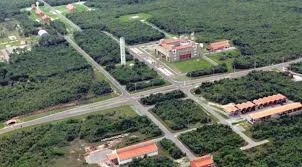Flight of the Quilombolas
A new pact between Brazil and the United States adds raw 21st century injustice to the shameful annals of racism in the Americas. It will expand a space launch center on land seized from descendants of enslaved black Brazilians known as “quilombolas.”
The Black Coalition for Rights in Brazil reports that:
“If the agreement is confirmed, about 800 quilombola families (more than 2,000 people) are expected to be expelled from their ancestral lands. There is no removal or displacement plan and it is not known where the government will take them.”[1]
Anthropologist Alfredo Wagner Berno de Almeida, researcher and professor at the State University of Maranhão, condemns the plan. “When you steal from a social unit your destiny, your future, you directly or indirectly cause insecurity in the group that can lead to its destruction,” he warns. “So this is a genocidal form. This is the greatest violence that can be committed against people, stealing their future.”[2]
Emancipated in 1888, two decades after the the United States ended slavery, many quilombolas settled on the northern coast of Brazil, near former sugar cane plantations. A century later, Brazil broke ground for the Alcantara space center. Close proximity to the equator, where the earth’s surface spins faster than at more northern and southern latitudes, makes it easier and less expensive to send many payloads into orbit. “
Health worker Luzia Silva Diniz, now a great grandmother, recalls scant regard for uprooted Afro-Brazilians:
”They promised that they would provide sustainability for these families, compensation, basic food basket and safety for everyone in our community. That did not happen. To this day we live in injustice.”[3]
Injustice persists because Brazil has failed to certify the ownership of land that quilombolas have inhabited for generations. In 2008, the National Institute of Colonization and Agrarian Reform (INCRA) allotted 300 square miles (78,000 hectares) to the descendants of slaves. The decision still awaits formal approval. Meanwhile, authorities ignore black citizens’ property rights with impunity, a policy endorsed by Brazil’s president, Jair Bolsonaro, who enjoys close ties with President Donald Trump. “If I arrive in the Presidency,” Bolsonaro vowed, “there will not be an inch demarcated for an Indian reservation or for a quilombola.”[4]
Presidents Jair Bolsonaro and Donald Trump. Source: CommonDreams.com
A catastrophic launch pad explosion in 2003 aborted Brazil’s space program. Legislators rebuffed interest by the US that ceded too much control over the Alcantara facility. A subsequent deal with the Ukraine sputtered when bills went unpaid. The current climate welcomes cooperation with a Trump administration that is keen to accommodate aerospace companies but blind to human impact.
Relocation inland to make way for launch facilities will impose devastating consequences on quilombola communities, warns a website dedicated to Brazilian women of African descent:
“When removed from the territories, the families are settled into the so-called agrovilas, places negatively described by the quilombolas. The land is 10 kilometers away from the sea, in infertile land and insufficient for the development of economic activities.”[5]
Quilombola leaders do not rule out compromise so long as justice is served. “We are not against development. What is not admitted is to end the quilombola right to land,” says Danilo Serejo, a quilombola of Alcântara, a political scientist and critic of the group’s human rights violations in the region.
Regional support has mobilized. “We’re about to engage in a campaign that their territory matters,” says Bruno Weis, communications coordinator for Instituto Socioambiental, an NGO that advocates for the human rights of oppressed Brazilians. In May, members of the Latin American Studies Association expressed support for quilombola rights.
Voices in the U.S. have yet to speak up for quilombolas under threat of displacement. Now is the time.
Banner image source: Spacenews.com
RESEARCH LINKS
[1]https://www.socioambiental.org/pt-br/blog/blog-do-isa/governo-bolsonaro-tenta-aprovar-acordo-de-alcantara-ma-na-marra [Translated from Portuguese: “Se o acordo for confirmado, cerca de 800 famílias quilombolas (mais de 2 mil pessoas) deverão ser expulsas de suas terras ancestrais. Não há um plano de remoção ou deslocamento e não se sabe para onde o governo os levará. Não houve consulta prévia às comunidades que serão atingidas, como exige a Convenção 169 da OIT.]”
[2]https://www.extraclasse.org.br/movimento/2018/09/acordo-ameaca-comunidades-quilombolas-de-alcantara/
[3]https://www.brasildefato.com.br/2019/03/19/comunidades-quilombolas-de-alcantara-ma-temem-futuro-com-presenca-dos-eua-na-regiao/ [Translated from Portuguese: "Quando chegaram aqui, eles prometeram que iam dar sustentabilidade para essas famílias, uma compensação, cesta básica e segurança para todos na nossa comunidade. Isso não aconteceu. Até hoje a gente vive na injustiça, porque nenhuma pessoa recebeu indenização do seu quintal, das suas terras, como o meu pai. Ele era dono de uma parte da terra, que nós hoje somos herdeiros, e nunca recebemos o dinheiro dessas terras."
[4]https://www.brasildefato.com.br/2019/03/19/comunidades-quilombolas-de-alcantara-ma-temem-futuro-com-presenca-dos-eua-na-regiao/ [Translated from Portuguese: “Se eu chegar na Presidência (…) não vai ter um centímetro demarcado para reserva indígena ou para quilombola”.
[5]https://www.almapreta.com/editorias/realidade/base-de-alcantara-e-a-violacao-de-direitos-dos-povos-quilombolas [Translated from Portuguese: “Quando retiradas dos territórios, as famílias são assentadas nas chamadas agrovilas, locais descritos de maneira negativa pelos quilombolas. Os terrenos ficam a 10 quilômetros de distância do mar, em terras inférteis e insuficientes para o desenvolvimento das atividades econômicas.”




